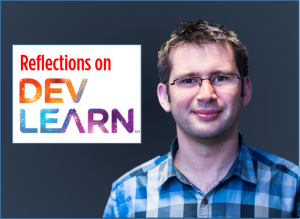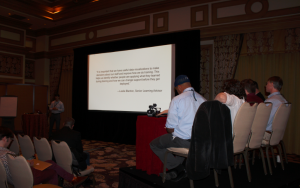#DevLearn Reflections: Confessions of a DevLearn Rookie by Colin Welch
 Today we welcome Colin Welch, Head of Production at Brightwave as he shares his thoughts about last week’s DevLearn Conference and Expo.
Today we welcome Colin Welch, Head of Production at Brightwave as he shares his thoughts about last week’s DevLearn Conference and Expo.
2014 was my first DevLearn. Unbelievably, it was also my first trip to the USA: my thanks to all of the lovely people who reassured me that Las Vegas isn’t a true representation of American life!
We flew in from the UK on Tuesday afternoon and despite the time difference (midnight for us) we flung ourselves straight in to the end of the xAPI Hyperdrive session.
From that point DevLearn was a relentless whirlwind that swept me along in its irresistible vortex, including over 12 sessions, demoing at DemoFest, some great conversations at the Brightwave booth, quite a few cocktails and a more than a few dollars lost at the blackjack table. I even managed to make it to Morning Buzz on two out of three days (seven-fifteen AM! You Americans are KEEN!). Coming all the way from England, we wanted to make the most of it – and boy did we do that. When we flew home on Friday evening I was asleep before the plane left McCarron’s tarmac.
I recorded a gonzo style vlog as we went along to capture these visceral experiences as they happened (available on the Brightwave blog and YouTube playlist if you want to revisit them), but now the whirlwind has moved on and the Mojave dust has settled, it’s time to reflect in a more measured way.
Here are some of the things I learned…
We’re beginning to understand the real potential of the xAPI
 We’ve been working with the standard since it was called Project Tin Can, and are on the third iteration of our xAPI-driven total learning system, so I was encouraged by the fact that I didn’t speak to a single person who didn’t at least know what xAPI is.
We’ve been working with the standard since it was called Project Tin Can, and are on the third iteration of our xAPI-driven total learning system, so I was encouraged by the fact that I didn’t speak to a single person who didn’t at least know what xAPI is.
It came up in so many of the sessions I attended, and I had some interesting conversations about how to plan what data we capture with it, how to design good xAPI statements and how to interrogate that data meaningfully once captured. It’s still early days, but I got the sense that the industry is getting closer to working out how to effectively capture informal learning – which has the potential to rewrite how we think about L&D from the ground-up.
We should keep an eye on emerging tech
I’m not a developer but I’m a real tech geek, so I attended a few tech-related sessions. It was great to hear the potential applications of augmented reality and virtual reality in learning discussed by such a switched on crowd. I particularly enjoyed Darren Nerland’s Learning in the Cloud session, where he had us workshop ideas together, and Allen Partridge’s AR Morning Buzz (where we set up the #AR101 twitter hashtag to continue the conversation beyond the conference). Some of the technologies under discussion are still not firmly in the consumer space, but 10 years ago we were trying to work out how to deliver learning to mobile, so it’s our duty to consider tomorrow’s technologies now and be ready.
Interactive film is great!
The technical barriers to delivering high quality video in online learning solutions are all but gone. We know that video can convey a lot of information in a short space of time, but with interactivity we’re also learning how to maximise retention and recall. This was nicely covered at Ty Marbut and Cass Sapir’s Interactive Video for Training. We love interactive film at Brightwave and it was great to see some other examples.
Smartphones are great for performance support…
…but not necessarily as a delivery mechanism for long e-learning courses. There are a lot of cool things being done with responsive design, but being responsive – at its heart just reorganising things on a screen – isn’t the whole answer. Good mobile solutions should be adaptive – i.e. relevant to context as well as being designed for a small screen. I enjoyed participating in the Why Mobile Is Critical to the Future of Learning and Performance panel session and hearing some of the different perspectives on this from some real experts.
Learning pathways and curation of learning resources are going to play a MASSIVE role
DevLearn reinforced my long-held belief that e-learning courses are only a tiny part of a good learning solution. The job of learning designers in the 21st Century is not just going to be repurposing content in to a series of interactive screens. Learning professionals need to learn how to design coherent pathways which help learners to navigate their way through a wide range of online (and offline) resources to achieve goals relevant to their own professional development, as well as the organisational aims of their employer. If we subscribe to 70:20:10 (which I do!) we should also be looking to provide easy ways for learners to record their own on-the-job learning experiences as part of those learning pathways, and share them with a community of practice online to facilitate peer-to-peer learning.
DevLearn is bigger and better
I’ve been to a lot of conferences and expos in the UK, some of which are bigger in terms of attendee numbers, but I can safely say that DevLearn trumped them all for quality (sorry compatriots). Whether it was in the magic of Vegas or just the way America does customer service I don’t know, but everything was well laid out, there was always someone to help, the app was brilliant (aside from the amount of rubbish posted in order to get points – the dangers of gamification!) and it was all just, well… slick! I’ve never been to an event in the UK where free ice creams and snacks are delivered regularly to the expo floor, or a bar (and a proper cocktail bar at that) is wheeled in at 5.30 so you can enjoy a G&T on your booth!
In Vegas, the house always wins
If you play for long enough you lose. I should have cashed in when I had the chance. I don’t think I was the only person who said that at the end of a day!
Despite my gambling losses, I loved DevLearn. Thank you eLearning Guild, and thank you Vegas!

Leave a Reply